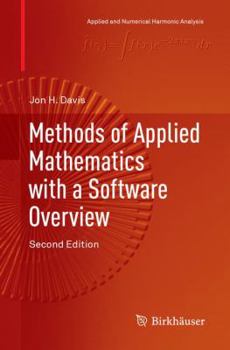Methods of Applied Mathematics with a Software Overview
Select Format
Select Condition 
Book Overview
This textbook, now in its second edition, provides students with a firm grasp of the fundamental notions and techniques of applied mathematics as well as the software skills to implement them. The text emphasizes the computational aspects of problem solving as well as the limitations and implicit assumptions inherent in the formal methods. Readers are also given a sense of the wide variety of problems in which the presented techniques are useful.
Broadly organized around the theme of applied Fourier analysis, the treatment covers classical applications in partial differential equations and boundary value problems, and a substantial number of topics associated with Laplace, Fourier, and discrete transform theories. Some advanced topics are explored in the final chapters such as short-time Fourier analysis and geometrically based transforms applicable to boundary value problems. The topics covered are useful in a variety of applied fields such as continuum mechanics, mathematicalphysics, control theory, and signal processing.Replete with helpful examples, illustrations, and exercises of varying difficulty, this text can be used for a one- or two-semester course and is ideal for students in pure and applied mathematics, physics, and engineering.
Key features of the software overview:
Now relies solely on the free software tools Octave, Maxima, and Python.Appendix introduces all of these tools at a level suitable to those with some programming experience
Provides references to sources of further learning.
Code snippets incorporated throughout the text.
All graphics and illustrations generated using these tools.
Praise for the first edition:
"The author mixed in a remarkable way theoretical results and applications illustrating the results. Flexibility of presentation (increasing and decreasing levelof rigor, accessibility) is a key feature...The book contains extensive examples, presented in an intuitive way with high quality figures (some of them quite spectacular)..." - Mathematica
"...Davis's book has many novel features being quite different from most other textbooks on applied mathematics.... Mainly it has a clear and consistent exposition with a strong focus on mathematical fundamentals and useful techniques. It has numerous extensive examples, illustrations, comments, and a very modern graphical presentation of results."...The book has style. Every theorem and mathematical result has a wonderful appealing comment." - Studies in Informatics and Control





